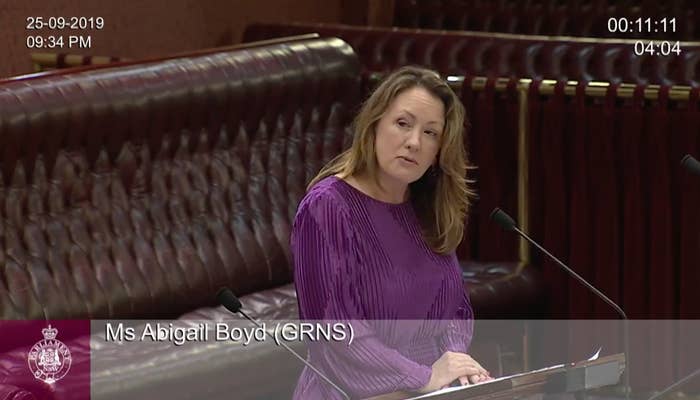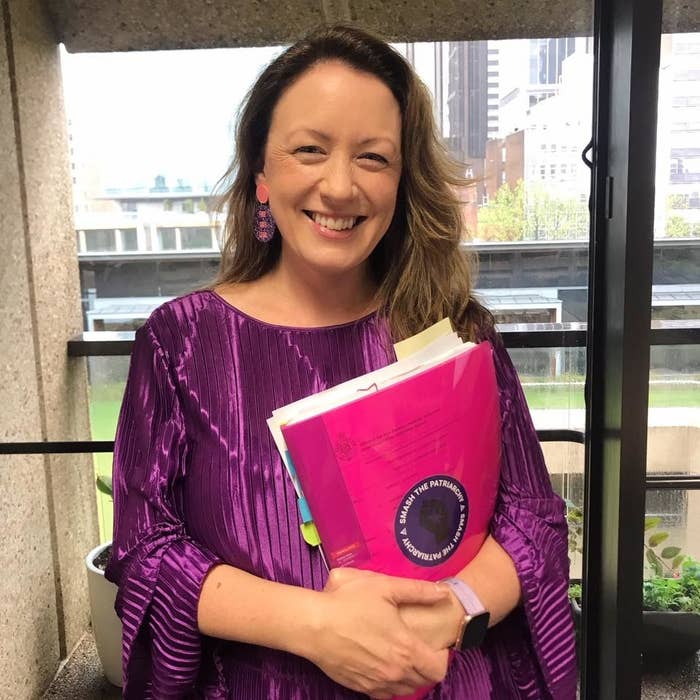
A bill to decriminalise abortion in New South Wales passed through the state's lower house on Thursday morning.
The night before, Abigail Boyd rose to speak in the state's upper house, where debate on the legislation had run for more than 30 hours over five sitting days.
"I am a survivor of child sexual assault," the Greens MP told the upper house. "As a young child I experienced a range of abuse, including rape. Long before I even began to menstruate I lived with the constant and pervasive worry that I was pregnant."
Boyd, one of the bill's co-sponsors, said she was "terrified" that one day she would become pregnant and that she would be "found out".
"As a 13-year-old I remember facing down my fears to ask a teacher how long sperm could live in the uterus after sex," she said. "Even after learning that sperm cannot get you pregnant years after having sex, I continued to have a recurring nightmare that I had become inexplicably pregnant and faced ridicule at school and being labelled a slut."
Years later, when she was trying to fall pregnant with her first child, Boyd thought back to those days a lot, she told the parliament.
"I wondered whether all of those thoughts about fearing pregnancy as a child and teenager had somehow made me unable to have children," she said. "When I did fall pregnant, every hiccup, every potential problem in my pregnancy brought with it those feelings of guilt — that if I lost my child it would be my fault for having been 'bad' as a child."
Boyd described the birth of her first daughter — a "wonderful and healing event" — and what it was like to lose her second pregnancy in the second trimester.
She then spoke about how the debate about this legislation had been rife with comments that were "insensitive to the realities of what it is like to be a woman in this world".
"The last couple of months in this place have been tough going, they have been triggering, they have been emotional," she said. "We have been mansplained to about the special circumstances we are placed in simply because we have a uterus— as if those of us physically abused on the basis of our biological differences were not already well aware."
Boyd told BuzzFeed News she decided to speak about her personal experiences in parliament because the debate was "intimately connected to women's autonomy over their bodies".
"I spoke not just as someone who had experienced a miscarriage but as someone who had my bodily autonomy taken away from me at an early age," she said.
During the debate, the third longest in the upper house's history, Boyd said men repeatedly spoke over her, and that her speech was a chance to talk without interruption.
“This is my closure, this is my moment of being able to say what I felt and hopefully giving a voice to what so many people during the debate were feeling," she said.
She has pointed out that male politicians said more than 320,000 words during the debate while women MPs said 90,000.

The inquiry into the bill and subsequent debate felt out of step with what polling consistently showed about the public's attitude to abortion, she said.
"The world I come from, 80%-plus of people are pro-choice and most people are horrified that [abortion] was ever a crime, and I was sitting there with these men who acted like every time I spoke, I was the radical one, I was the one who was out of line and out of touch with the sentiments of the community," she said.
"Even during the inquiry we had one and a half days of primarily religious leaders and religious-based organisations speaking as though that was somehow equivalent to what doctors, lawyers and frontline family violence workers were saying."
As a "relatively privileged woman", Boyd said it was the first time she felt really oppressed in her workplace.
"There is no-one you can complain to about politicians being sexist and misogynist, you just have to sit there," she said.
One of the most offensive parts of the debate, she said, was when Labor politician Greg Donnelly, a staunch anti-abortion advocate, described a surgical abortion in detail.
"As though we don't already know [what an abortion involves] and we hadn't already thought of it," Boyd said. "It was the ultimate in mansplaining."
@ABCFactCheck Greg Donnelly (ALP): There is the woman and the unborn and with respect to the unborn the unborn is innocent, absolutely vulnerable, defenceless and voiceless. Dare I say we were all once them. The deliberate termination of the pregnancy can never be healthy for the unborn.
It was "quite lonely" at times during the debate, she said.
"[Many people sitting in the public gallery] were very anti-choice so there was a lot of booing and hissing and laughing at me in particular," she said.
But there were moments of solidarity across the chamber during the long debate, Boyd said, when people would sit next to her during contentious divisions or tell her they were "grateful" for her contributions but couldn't speak about the issue "because of their internal party politics".
The bill passed despite fierce opposition from members of the government, three of whom unsuccessfully attempted to topple NSW premier Gladys Berejiklian over it.
Boyd found solace knowing Family Planning NSW chief executive Ann Brassil was sitting in the public gallery, "often surrounded by nothing but anti-choice people".
"I would look across and think 'if she can do it for decades and decades, I can hang in there for another day of debate'," she said.
In her speech, Boyd said her colleagues, staff, and those campaigning for this reform had been accused of being "heartless" and "not understanding pregnancy and parenting" because they were "standing for the right to choose".
"Foetus dolls have been sent to women who, like me, know what it is like to lose a wanted pregnancy and who have mourned the loss of a foetus," she said.
"Attempts by some anti‑abortion campaigners and politicians to use emotional and at times graphic and confronting content to change the minds of pro‑choice politicians, on the mistaken assumption that we lack compassion or do not have a deep understanding of the issue, have not only missed the point, they have also caused such unnecessary distress to those who have already experienced trauma."
